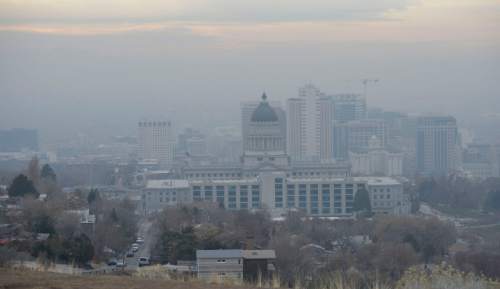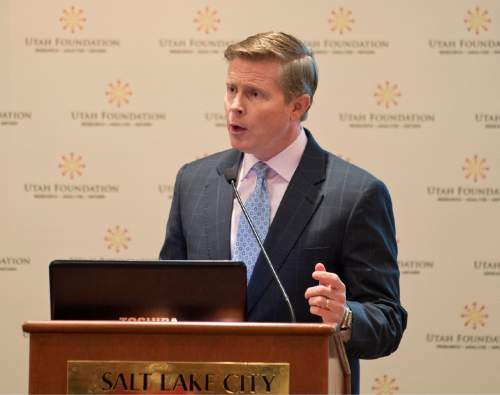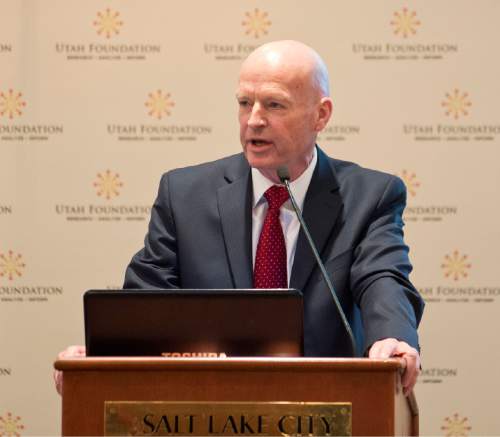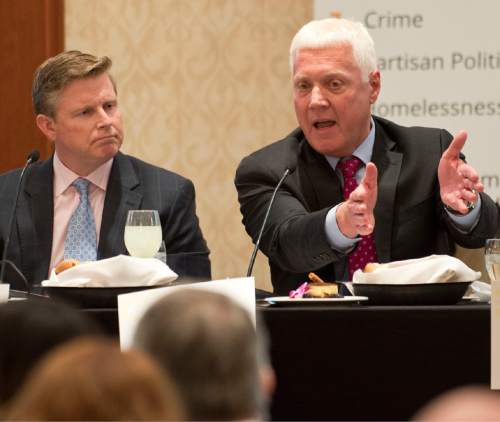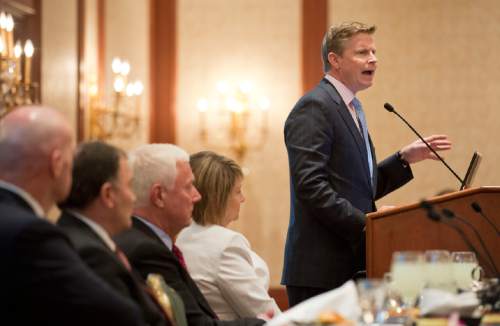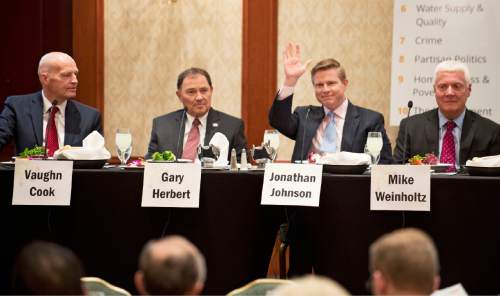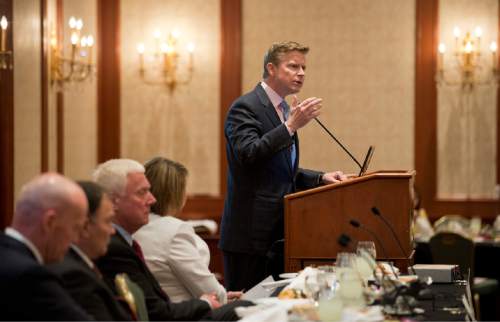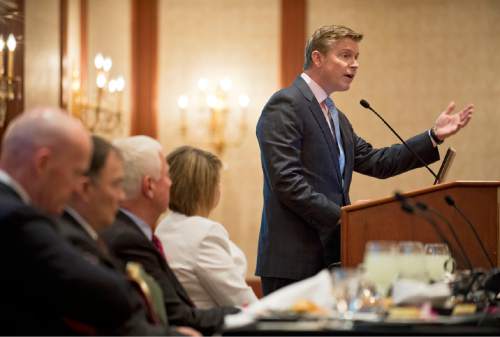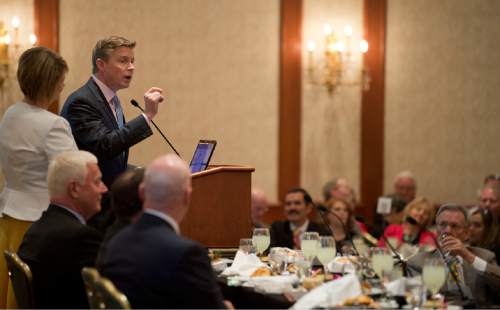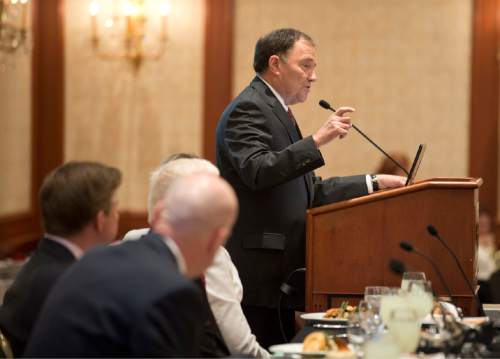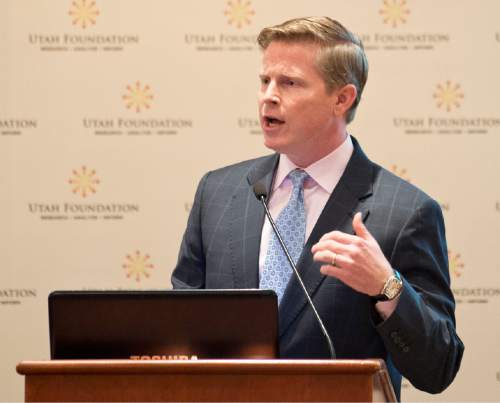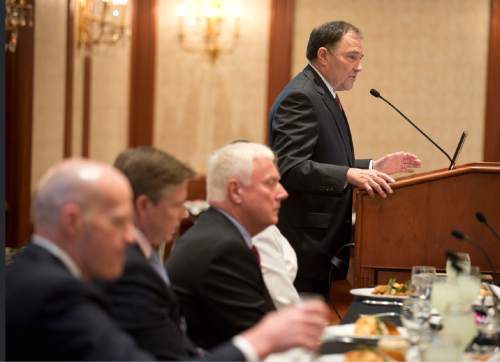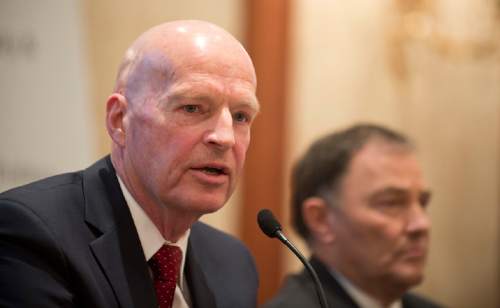This is an archived article that was published on sltrib.com in 2016, and information in the article may be outdated. It is provided only for personal research purposes and may not be reprinted.
Challengers of Utah Gov. Gary Herbert attacked him from the left and right Thursday as a career politician who stopped listening to people. The governor countered that he has a strong record that improved Utah's economy and schools.
That came in a joint appearance by the four top candidates for governor — Democrats Mike Weinholtz and Vaughn Cook, and Republicans Herbert and Jonathan Johnson — at a luncheon where the Utah Foundation unveiled results of a poll showing what Utah voters list as their top 10 concerns this election year.
The survey said those issues, in order, are health care, air quality, education, state taxes and government spending, jobs and the economy, water supply and quality, crime, partisan politics, homelessness and poverty, and the environment.
On the top issue of health care, the Democrats bashed Herbert for not taking advantage of "Obamacare" funding to fully expand Medicaid — while Johnson complained Herbert tried too much to follow President Barack Obama's wishes.
A Medicaid-expansion bill Republicans passed will help just 16,000 people who are homeless, mentally ill or extremely poor. Weinholtz, chairman of CHG Healthcare, said that "is an insult to all Utahns."
He said it covers "the least amount of Utahns at the most expensive price. So not only was this morally bankrupt, but it was fiscally irresponsible."
Weinholtz said because Herbert opted not to accept full Medicaid expansion, Utahns are leaving hundreds of millions of dollars in federal taxes they pay on the table every year. "It's a great example of putting politics before people."
Cook, CEO of Zyto Technologies, said, "I think we should stop bickering about Obamacare, and being embarrassed to think we're going to take advantage of it. I think we should take advantage of it," and accept all it offers to help the uninsured.
Johnson, chairman of Overstock.com, blasted Herbert's failed "Healthy Utah" proposal for Medicaid expansion, which would have covered far more people than the final bill successfully pushed by House Republicans but fewer than Obamacare allowed.
Johnson said the governor's proposal relied "on federal dollars and expanding it the way the federal government wanted us to expand it. We should be expanding it on our own terms.… We should be figuring out how we get our dollars back without taking uncapped, unbound liabilities on our own taxpayers."
Herbert defended his record and compromise.
"Sometimes you take what you can get in the political arena," he said. While he preferred his Healthy Utah plan, he said the bill that passed "is better than doing nothing."
He added, "I'm proud that here in Utah we have the lowest-cost health care with the highest quality available in America today. We're doing something right."
On air quality, the No. 2 issue, Johnson again blamed Herbert. "We need a governor that takes the lead on this, and not someone that dillies and dallies on the issue and dabbles around the edges."
Weinholtz agreed. "We first have to get serious about this problem, and I haven't seen any evidence of that. We have only been nibbling around the edges."
Herbert countered: "We're not sitting around twiddling our thumbs."
He signed a bill to reduce pollution from water heaters, which may cut key nitrogen oxide pollution statewide by 35 percent. He said he is working with refineries to implement cleaner Tier 3 fuels. "Tesoro, one of our refineries, has agreed to do that, and I think others will follow."
Cook, meanwhile, called for more education efforts to enlist Utahns to individually reduce air pollution, and said that may be the most effective way to combat it.
On education, the No. 3 issue, Cook said, "The way we have treated education over the last 20 years, frankly, is embarrassing…. I think the fact we have the lowest spending in the nation per student is not something to beat our chest about."
Weinholtz said Republican tax cuts and raiding of education funds have hurt schools. While some funding was increased this year, "It's not enough."
Herbert said previous cuts to education halted when he took office, and the state has added $1.8 billion in new money for schools in the seven years he has served.
"Some of us want to raise taxes" for schools, Herbert said, adding "that's the Democratic approach." Instead, he said his policies have helped make Utah's economy among the strongest in the nation, which naturally generates more for schools.
Johnson, meanwhile, called for changes to give more control to local school districts, and complained the state mandates one curriculum for all. "Just as I don't think we ought to be dictated to by Washington, I don't think the rest of the state should be dictated to by Salt Lake."
Johnson also criticized "people who have been in politics for a long time" who become partisan, comfortable with power and "forget the people. I love the fact that three of us up here aren't politicians. We're businessmen, and we're here to represent the people."
Herbert again defended his record, saying education scores by Utah's youth are among the nation's highest, its taxes are among the lowest, its economy is among the healthiest and magazines rank the state as the nation's best-managed. "I have a great track record, I think."




